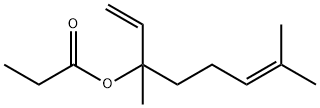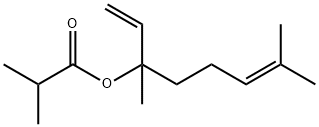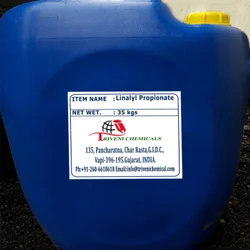LINALYL PROPIONATE
Synonym(s):Linalyl propanoate
- CAS NO.:144-39-8
- Empirical Formula: C13H22O2
- Molecular Weight: 210.31
- MDL number: MFCD00048607
- EINECS: 205-627-5
- SAFETY DATA SHEET (SDS)
- Update Date: 2025-12-17 09:49:15

What is LINALYL PROPIONATE?
Description
Linalyl propionate has a sweet, floral odor reminiscent of bergamot oil and a sweet taste reminiscent of black currant (also pear and pineapple). May be synthesized by esterification of linalool with propionic acid or propionic anhydride.
Chemical properties
Linalyl Propionate is a liquid with a fresh bergamot note, reminiscent of lily of the valley. It is used in perfumery in, for example, bergamot, lavender, and lily of the valley compositions.
Chemical properties
Linalyl propionate has a sweet, floral odor reminiscent of bergamot oil and a sweet taste reminiscent of black currant (also pear and pineapple).
Occurrence
Reported found in orange, lemon and kumquat peel oils, bergamot oil and cherimoya. The l-form has been reported found in lavender and sage.
The Uses of LINALYL PROPIONATE
Linalyl propionate is widely used in perfume compositions, not only as a support to Bergamot-notes, but in general as a sweet fresh additive in Citrus fragrances, light florals, herbaceous types or Ambre bases. It blends excellently with Clary Sage and Bergamot for Fougere opnotes, and introduces soft sweet notes as background for the middle notes of Muguet, Lilac, Freesia and many other floral types. The ester finds use in flavor compositions, partly as a sweetener, partly as fruity back-ground in imitation Banana, Blackcurrant, Redcurrant, Orange, Pear, Pineapple, and in “Tutti-frutti” etc. Concentration is normally about 3 to 12 ppm in the finished product.
Preparation
By esterification of linalool with propionic acid or propionic anhydride.
Definition
ChEBI: Linalyl propionate is a monoterpenoid.
General Description
Linalyl propionate occurs naturally in green tea and essential oil of Annona muricata fresh fruit pulp.
Properties of LINALYL PROPIONATE
| Boiling point: | 115 °C10 mm Hg(lit.) |
| Density | 0.895 g/mL at 25 °C(lit.) |
| vapor pressure | 5.5-9.8Pa at 20-25℃ |
| FEMA | 2645 | LINALYL PROPIONATE |
| refractive index | n |
| Flash point: | 207 °F |
| solubility | Very slightly soluble in water, soluble in alcohol and oils. Slightly soluble in Propylene glycol, insoluble in Glycerin. |
| form | clear liquid |
| color | Colorless to Almost colorless |
| Specific Gravity | 0.90 |
| Odor | at 100.00 %. fresh bergamot lily woody rose rum |
| JECFA Number | 360 |
| CAS DataBase Reference | 144-39-8 |
| NIST Chemistry Reference | 1,6-Octadien-3-ol, 3,7-dimethyl-, propanoate(144-39-8) |
| EPA Substance Registry System | 1,6-Octadien-3-ol, 3,7-dimethyl-, propanoate (144-39-8) |
Safety information for LINALYL PROPIONATE
| Signal word | Warning |
| Pictogram(s) |
 Exclamation Mark Irritant GHS07 |
| GHS Hazard Statements |
H315:Skin corrosion/irritation H319:Serious eye damage/eye irritation H335:Specific target organ toxicity, single exposure;Respiratory tract irritation |
| Precautionary Statement Codes |
P261:Avoid breathing dust/fume/gas/mist/vapours/spray. P264:Wash hands thoroughly after handling. P264:Wash skin thouroughly after handling. P271:Use only outdoors or in a well-ventilated area. P280:Wear protective gloves/protective clothing/eye protection/face protection. P302+P352:IF ON SKIN: wash with plenty of soap and water. P305+P351+P338:IF IN EYES: Rinse cautiously with water for several minutes. Remove contact lenses, if present and easy to do. Continuerinsing. |
Computed Descriptors for LINALYL PROPIONATE
New Products
4,4-Difluoropiperidine hydrochloride tert-butyl 9-methoxy-3-azaspiro[5.5]undecane-3-carboxylate Indole Methyl Resin N-Isopropylurea N,N-Dicyclohexylcarbodiimide(DCC) MELDRUMS ACID 5-METHYLISOXAZOLE-4-CARBOXYLIC ACID Magnessium Bis glycinate Zinc ascorbate 1-bromo-2-butyne 2-acetamidophenol 9(10H)-anthracenone Erythrosin B, 4-Piperidinopiperidine 2-((4-morpholinophenylamino) (methylthio) methylene) malononitrile 2,4-dihydroxybenzaldehyde 3-(4-morpholinophenylamino)-5-amino-1H-pyrazole-4-carbonitrile Methyl 2-methylquinoline-6-carboxylate 2,6-dichloro-4-nitropyridine 4-Bromo-2-chlorobenzonitrile 2-(benzylamino)acetic acid hydrochloride 4-(tert-Butoxycarbonylamino)but- 2-ynoic acid 3,4-dihydro-2H-benzo[b][1,4]dioxepine 1-Phenyl-1-cycloprppanecarboxylicacidRelated products of tetrahydrofuran








You may like
-
 Linalyl Propionate CAS 144-39-8View Details
Linalyl Propionate CAS 144-39-8View Details
144-39-8 -
 Linallyl propionate CAS 144-39-8View Details
Linallyl propionate CAS 144-39-8View Details
144-39-8 -
 Linalyl propionate CAS 144-39-8View Details
Linalyl propionate CAS 144-39-8View Details
144-39-8 -
 Industrial Grade Liquid Linalyl PropionateView Details
Industrial Grade Liquid Linalyl PropionateView Details
144-39-8 -
 3-(4-amino-1-oxoisoindolin-2-yl)-1-methylpiperidine-2,6-dione 98%View Details
3-(4-amino-1-oxoisoindolin-2-yl)-1-methylpiperidine-2,6-dione 98%View Details -
 20677-73-0 (2,2-diethoxyethyl)methylamine 98%View Details
20677-73-0 (2,2-diethoxyethyl)methylamine 98%View Details
20677-73-0 -
 3-(4-(hydroxyamino)-1-oxoisoindolin-2-yl)piperidine-2,6-dione 98%View Details
3-(4-(hydroxyamino)-1-oxoisoindolin-2-yl)piperidine-2,6-dione 98%View Details -
 57381-49-4 2-bromo-4-chlorobenzonitrile 98%View Details
57381-49-4 2-bromo-4-chlorobenzonitrile 98%View Details
57381-49-4
